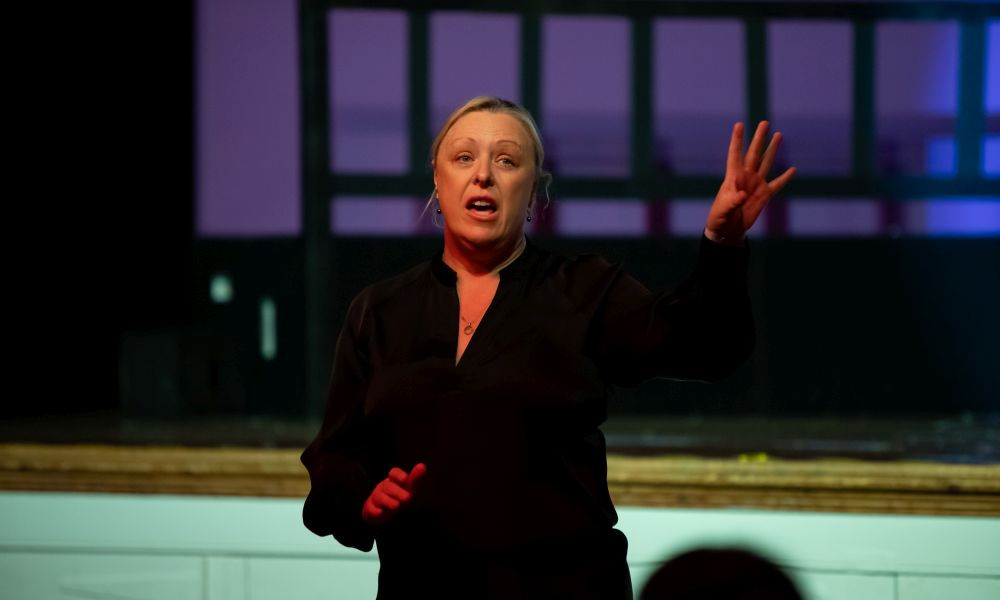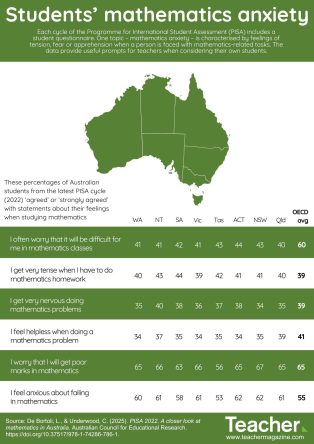Mathematics anxiety is characterised by feelings of tension, fear or apprehension when a student is faced with mathematics-related tasks. We know that maths anxiety and negative attitudes towards the subject impact student engagement, learning and achievement (Buckley, 2020; Sniedze & Buckley, 2024). St Raphael’s School in Adelaide, South Australia, has just hosted a week-long celebration designed to tackle maths anxiety and bust myths.
‘The Maths Movement – Real World Maths Unleashed’ included classroom activities showcasing the presence of mathematics in everyday life, and a Parent Truth Bomb Panel (Raising Everyday Mathletes with Real World Maths) featuring experts including maths specialists, the Primary Mathematics Association of SA and Mathematical Association of SA. The panel event wasn’t just for families with children in kindy to year 6, but open to all members of the community. In our latest leadership Q&A, Principal Emma Fowler shares more.
Hi Emma, thanks for talking to Teacher today – can start by telling readers more about your school and leadership?
St Raphael’s is a vibrant Catholic primary school in Parkside, nestled just on the fringe of Adelaide’s CBD. We’re a close-knit community with a distinct emphasis on individual care and inspired learning for our 120 students from Reception to year 6. Our smaller size gives us a wonderful sense of connection where every child is known and nurtured.
I’ve been Principal here for 2 years and this is my first principalship. It’s been a privilege to walk alongside our staff, families and students in building a culture of curiosity and confidence, not just in maths but across all learning areas.
The school has just hosted a week-long celebration designed to bust the myth that some people just ‘aren’t maths people’. Where did the impetus for this come from?
The idea grew from what both research and our own observations tell us – that maths anxiety is very real, and it doesn’t just affect children. Many adults carry the mindset that they’re ‘not a maths person’, and that belief can influence how children approach the subject.
As a school, we wanted to challenge that narrative. Our staff have been exploring ways to make maths learning visible, joyful, and relevant. This week was a natural extension of that – a chance to engage not only students but also parents and the wider community in rethinking what it means to ‘do maths’.
One of the goals was showcasing the presence of maths in everyday life. Can you share more on some of the classroom activities that students enjoyed?
We had such a variety of activities! During The Maths Movement week at St Raphael’s, classrooms and partner kindergartens came alive with our Tournament of Numbers – a sequence of hands-on maths challenges designed for every age. Activities were tailored to each year level, so children could explore maths at their own pace through playful, real-world scenarios. For example:
- Reception students explored patterns and shapes through dance and movement, discovering how rhythm and repetition are mathematical.
- Middle years students investigated maths in sport, calculating angles and trajectories in volleyball.
- Older students engaged in financial literacy challenges, such as budgeting for a school event, making maths both practical and empowering.
We deliberately chose activities that helped children see maths not just as numbers on a page, but as something they encounter and use every day – as a vibrant and practical part of life beyond the classroom.
Another highlight was the Parent Truth Bomb Panel, which sounds interesting! Can you explain more about this, and why was it an important part of the week?
The Parent Truth Bomb Panel was a lively and honest conversation! Parents shared the ‘truth bombs’ they had carried about maths, such as:
- ‘I was never good at maths’
- ‘I’ll never use algebra in real life’
- ‘Maths is only about getting the right answer’
Our experts unpacked these myths and reframed them in more positive, growth-oriented ways.
Parents walked away reassured and equipped – with positive maths language they could use at home, strategies like saying ‘I can’t do it yet’ and everyday examples for making maths visible – through sharing cooking, shopping and planning with their children and noticing the inherent maths within these daily activities.
We felt it was vital to go beyond classroom learning and empower parents, because children often absorb their attitudes toward maths from home. Empowering parents was a deliberate step; families have asked us for help in finding language and confidence to talk about maths at home and this panel was a way to meet that need in an engaging, non-threatening way.
Why was it important to partner with the mathematical associations for this panel?
Partnering with professional associations gave us access to deep expertise and fresh perspectives. It signalled to our community that maths is valued well beyond the classroom – it’s a discipline with broad application and significance.
For our teachers, it also provided professional growth opportunities and affirmed the work we’re doing to embed innovative approaches to maths learning. For families, it helped show maths as broader than just schoolwork: it's a life skill, a creative tool, and a gateway to future opportunities. It also showed that, as a school, we’re not tackling maths education in isolation but drawing on the best available knowledge and actively invested in best practice and continuous improvement.
This only happened last week so I’m sure you’ll get more feedback over the coming days, but what has the initial response been from students, parents and teachers? And do you see this becoming a regular event?
The feedback has been overwhelmingly positive. Students loved the hands-on, creative activities that showed them maths in action. Parents appreciated the opportunity to have honest conversations and to learn practical ways of supporting their children. Teachers enjoyed the chance to connect with families around learning in a fresh, engaging way.
Given that enthusiasm, I can definitely see this becoming a regular event at St Raphael’s. We’d love to continue building on this momentum – making maths not just a subject we learn, but a mindset and a life skill we celebrate together as a community. We aim to keep maths visible, joyful, and accessible, supporting every child, parent, and teacher to embrace maths as a vital, everyday skill.
References
Buckley, S. (2020, October 14). Using an evidence base to understand, reduce and manage mathematics anxiety. Teacher magazine. https://www.teachermagazine.com/au_en/articles/using-an-evidence-base-to-understand-reduce-and-manage-mathematics-anxiety
Russell, D. (2025, June 13). Infographic: PISA insights – students’ mathematics anxiety. Teacher magazine. https://www.teachermagazine.com/au_en/articles/infographic-pisa-insights-students-mathematics-anxiety
Sniedze, S., & Buckley, S. (2024, March 25). Teacher resources: Mathematics anxiety and engagement. Teacher magazine. https://www.teachermagazine.com/au_en/articles/teacher-resources-mathematics-anxiety-and-engagement
How are you promoting a positive maths culture to your own students and school community? What opportunities are there to collaborate with others, such as professional associations?
What strategies are you using to help families feel more empowered to support maths learning at home? In this Q&A, Principal Emma Fowler shares 3 ‘truth bombs’ parents had carried about maths. What are the myths carried by students and parents in your own school context?



